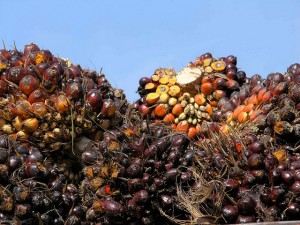
The Roundtable on Sustainable Palm Oil (RSPO) 8th Annual Meeting is coming up November 8-11th in Jakarta. RAN’s rainforest agribusiness team will be there.
Indonesia is the world’s 3rd largest greenhouse gas emitter, after the U.S. and China, due to the rapid conversion of the forest country’s valuable rainforests for the expansion of two insatiable, destructive industries: palm oil & pulp and paper.
So why would RAN attend a mostly pro-palm oil industry meeting? Well, for starters, we’re going to make sure that Cargill feels the heat for breaking it’s promise and continuing business as usual with rainforest destroyer Sinar Mas.
What will happen between the RSPO and the palm oil producer, rainforest destroyer, and RSPO member: Sinar Mas? And what will Cargill do if one of their key suppliers gets kicked out of the RSPO? This could be one juicy show!
The Roundtable on Sustainable Palm Oil is in charge of monitoring the actions of its members to make sure that they follow its required code of conduct. In theory, if a member of the RSPO is violating that code, there is a grievance process to file a complaint, evaluate the grievance, and require action from the company or dismiss them from the RSPO. This grievance process is critical if membership in the RSPO is to have any meaning.
For the first time ever the RSPO seems to actually be doing its job. Now we’re all waiting and watching to see if they actually see it through and take a stand against some of the world’s biggest rainforest villains.
On September 16th, in the wake of an audit confirming accusations of environmental abuses by the controversial Indonesian palm oil supplier Sinar Mas, Cargill announced its decision to continue business as usual with the disgraced palm oil provider claiming that it was “satisfied” with the company.

To add insult to injury, on September 23rd (the same day we dropped two billboard sized banners outside of Cargill’s downtown Minneapolis Grain Exchange office) the RSPO announced that they are publicly censuring Sinar Mas – a decision that could lead to Sinar Mas getting kicked out of the RSPO.
As the Jakarta Globe reports:
“Members who have been found to not be in compliance and who continue to be in non-compliance with the RSPO regulations could ultimately face sanctions, including the suspension and, eventually, the termination, of their membership of the RSPO.”
Cargill has been under increased public scrutiny for continuing to purchase palm oil from Sinar Mas since this announcement that the RSPO is taking action to possibly sanction Sinar Mas for breaking the rules.
This is quite significant for two reasons. First, it marks the first time in history since it’s creation in 2003 that the RSPO is taking action to hold its member companies accountable for violating RSPO Principles and Criteria. Secondly, despite the announcement making clear Sinar Mas’ culpability for rainforest destruction, Cargill is failing to keep its promise, which was to drop Sinar Mas as a suppier if the company was found to be destroying rainforests.
Cargill’s lack of action on Sinar Mas has disappointed several U.S. companies who are actively seeking responsible sources of palm oil.